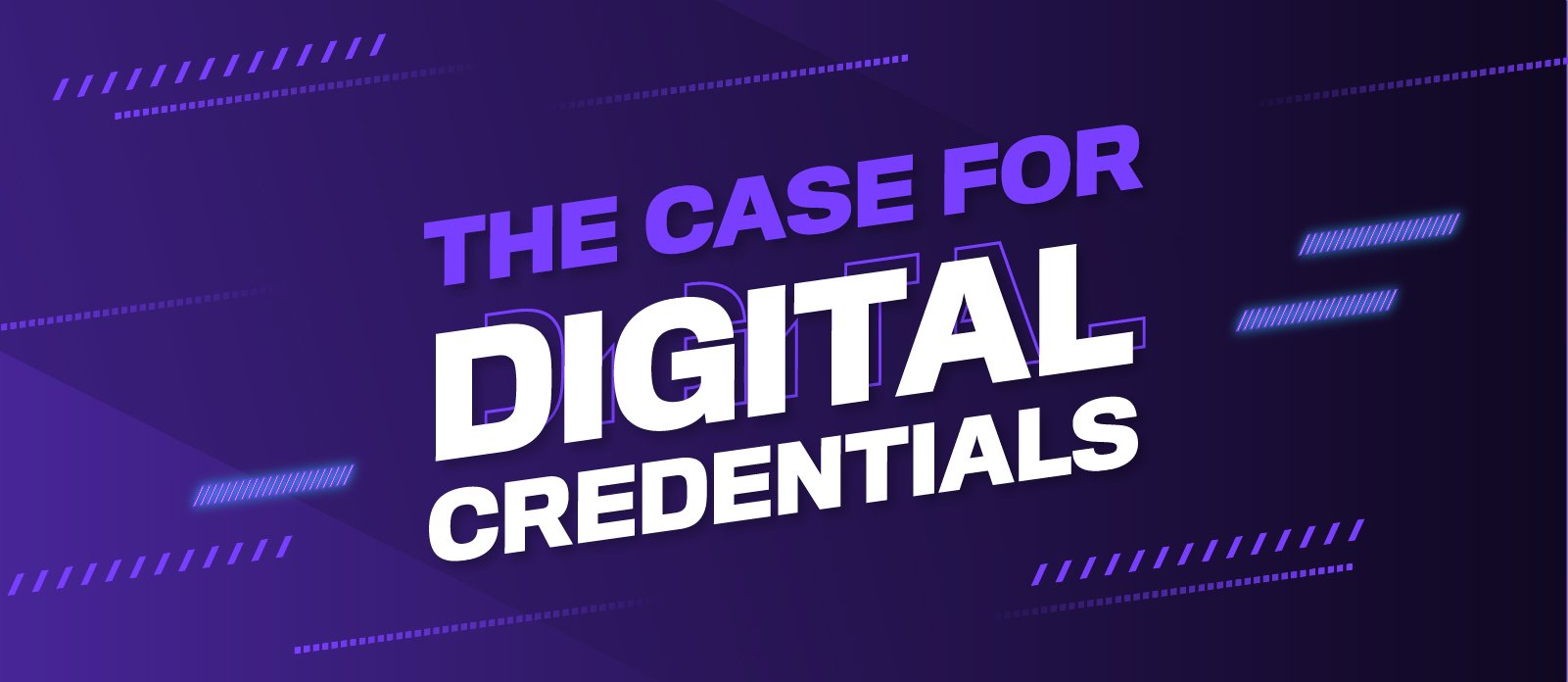
Translating a student’s higher education outcomes into terms that employers can actually understand (and trust) is a challenge for all parties involved. Job-seeking students are eager to share what they know, but employers often struggle to understand and verify the student’s capabilities.
I recently sat down with Credly’s Chief Success Strategist, Dr. Susan Manning to discuss what “digital credentials” can do to help create a common language and to bridge the communications gap between employers and prospective employees.
Susan has taught graduate courses and authored books in instructional design, technology tools, universal design for learning. Susan earned her Doctorate in Adult Education, her Master’s in College Student Personnel, and is a certified Credentialing Specialist.
If you’d like, you can listen to our conversation in podcast form here:
What follows below is part 2 of a lightly-edited transcript of our conversation. (Part 1 of our conversation can be found here.)
IE: You mentioned the terms equity and access as part of Credly's mission. In terms of equity and access or accessibility, is there a group of learners where these digital credentials help most?
SM: I think in the early days, we saw credentials offered by training providers that were engaged in the boot camp world. So you wouldn't have to go for a four-year degree at a certain price point, but you could go into a training program and pick up some very measurable skills, get that under your belt and then move forward maybe in a new career or at a little less of an investment. And that opens access to a wider range of learners and people who could acquire those skills. That's one of the areas where I see so much potential for digital credentials, and more and more companies are dropping the degree requirement and saying we want to have people with verified skills. IBM and Google come to mind. And so this is a way for underrepresented populations to pick up those skills that are going to be career-enhancing without a doubt. Or open the doors to a whole new career.
IE: Of course, it raises the question, are you competing with universities and colleges?
SM: I like to think of it as a compliment, but I suppose there are some people who will choose not to complete a degree if they could access training that gets them where they want to be. I'm going to tell a personal story, actually. My oldest child was in her third year at a university, and she said, "You know what? I don't like this. I don't like what I'm studying. This is not working for me." So given that we were spending a lot of money, she stopped. She did some research. She found a program that is certified surgical technologist program. I didn't even know what that was. She stands in the operating room and assists the surgeon. She loves it. It got her in there. I think it was 10 months plus an internship. And that was her career trajectory.
Now, she may go back and finish that Bachelor's degree, but what she wanted at that time was to get to work, and that's what it allowed her to do. In her case, the credential is not digital, and we laugh about this a lot because she constantly has to find her card, her membership card, her certification of some sort. Of course, I've said, wouldn't it be nice if... But I think for some learners, that is a better pathway for them.
IE: So it's really about the individual's journey and considering what their goals are in life and measuring that or balancing that with possibly some of the expectations or sacrifices that are made with the four degrees. Do you have any feedback or any advice to those people, maybe administrators who are concerned about digital credentials and how they might devalue a Bachelor's or Master's degree?
SM: I think rather than looking at it as devaluing, look at what you can add to enhance your degree completion. Higher education is expensive in terms of not just dollars but the time that learners put into that. What can you be adding to their experience that the learner feels they can take away and apply on the job right away?
IE: And that rolls up to the mission of higher education, is to be a means of ascension for individuals within a society. And so if you come at it with that viewpoint of these can complement and enhance your education, then I think, yeah, it doesn't even factor the fact that this is devaluing a Bachelor's or Master's degree at all.
SM: There are folks that get so far into a career, maybe you've been working 30 years, and you're feeling a need to make a change. Is it worth going back for a second Master's? Or could you pick up certain certifications that might allow you to do a career shift? So I think economically, there's another population that we need to consider. I'm especially mindful of women in their 50s who might want to try something different, and a degree might not pay off.
IE: I think for all of us who are lifelong learners and will change our careers or want to change our careers at some point down the road, this is a great option. So I love the picture that you painted there for us. And I guess if you were to approach a university, say, Dean's cabinet, how would you suggest to them that they implement these digital credentials? Would it be an incremental adjustment per class? Would it be maybe taking the whole department? What are the best ways to implement these?
SM: I somewhat think it depends on what department or what school. There are some areas... Let's say you are in charge of computer science. There might be technical skills that you could align your program with existing credentials, again, that students could test for. I gave the example earlier of Adobe, but there are a whole lot of product certifications out there that... Tableau, for instance. You might have students in your business school who are learning how to use Tableau. What could you do for them to help them become certified in some way? So you could look at options like that. You could also look at your transferable skills. Are you teaching critical thinking? The University of Buffalo has wonderful micro-credentials tied to issues like social justice. So, where in your coursework might you acknowledge skillsets that aren't popping out of a full degree?
IE: So I guess the other way of reframing that question is, do you see the rollout or the implementation happening at the faculty level, per class or per course, or have you seen success, and do you advocate for a university to kind of do this audit and implementation more at the program level, or the institutional level?
SM: I've seen it done both ways, all ways actually. I think when you do it at the course level, you've got to be very, very clear that that course is going to make a difference in the person's overall competencies.
IE: And at the institutional level or at the program level, are there challenges?
SM: Yeah. The challenge is getting a whole lot of people to come to the table and say, "Yes." We're talking about higher education here.
IE: So how do we take our students' experiences, transcended beyond the business school and the communications department and whatnot, and package it together so that it is a meaningful credential. But that takes a lot of coordination.
SM: Yeah, and you need approval or buy-in with many key stakeholders, and as you alluded to, that's not the easiest thing to do at an institute or academy. So your title contains the word success in it. Does Credly provide a success-partner, or some coach to help with this onboarding or implementation?
IE: Absolutely. Depending on the level at which you described to us, you may have someone like me who walks you through this process, and governance is a huge part of it is starting up, tying your credentials to your overall mission, for instance. We start there. And then we build to what meaningful metadata are you going to want to include, and what's your assessment strategy and how are we going to represent this, and what buttons do we push? But we start with the bigger picture, yes, absolutely. Even those who choose to do more of a self-paced onboarding still get some of that content because ultimately, we want the people who are creating credentials on our platform to do so with quality because then that just strengthens the entire ecosystem.
IE: Yeah, I know a lot of listeners are going to be intrigued by this and maybe even inspired and motivated to take that next step, and knowing that there's someone there to help guide that process, I think that's going to be really helpful, put their mind at ease so to speak. So we touched on this, but just to put a finer point on it, who at your university, school, or college, who would play the biggest role from your team? Would it be the faculty or the administrators, or the deans? Who's sort of the one to usher this in? Have you seen any trends there between faculty, administrators, or deans on who champions this?
IE: I will say that the most successful programs I can think of have, I'd first want to say, have support from
the top, and that support includes release time for faculty to develop these programs. The ones that struggle are the ones where faculty are expected to pick up this task, but they're not really given room to do that. That's just where the problem is. There are only so many hours in the day, right?
IE: So that makes me think, when do you start designing? Let's say you're doing a review of your syllabus, a faculty member reviewing the syllabus, getting ready for fall, when would you begin planning for implementation of these credentials? Would it be one year? Could you do it in a month, a week?
SM: I wouldn't recommend doing it in a month. I would say at least one semester.
IE: Okay. So that's a comfortable amount of time to review your syllabus, see where you might plug these in, and then take the rest of the time to really, as you mentioned, upload the rubric, get set up in the system, work with your success coach.
SM: There's a huge aspect, too, that we haven't touched on, and that is marketing. And I specifically mean marketing to the earners to help them understand what's coming, what they can do with these credentials, and coaching them through what happens when they get it. But to that point of starting up, some of it depends on how familiar the faculty are with these concepts. I do have a group that came to me this summer and said, "We've already been studying this. So we know where this plugs into our curriculum. Here are the standards. Here's what we're thinking of." And they even went to their marketing people and had the visual design done. Because it was a small academic unit, there were able to get up and running within a month. But that is the exception versus the rule. Most institutions need at least a semester to get everything together before they're ready to offer it.
IE: So you're saying too that if you have some marketing and communications behind this, this could actually increase the perceived value of your course and maybe even help usher in other courses within your program to adopt digital credentialing.
SM: Without a doubt. Yeah.
IE: I love that point. And you mentioned a word, this struck me. You said earners instead of learners. Is that a vernacular change that you've made at Credly?
SM: No. Some of us will say both, learner-earner, almost as a hyphenated term. There are some credentials where nobody goes through a... The issuer is not providing background education for it. Some certifications, you can learn the content elsewhere and then come take the test, and you get the certification, right? So in that case, somebody is an earner. In higher education, it's usually a use case where the person comes to school and they learn through that institution, and then they receive the credential. So then we would call them a learner. They could be a learner or an earner.
IE: Yeah, and you could probably also make a case that you are earning and learning, and you're learning and earning. So hence the hyphenation.
Like what you're reading? Sign up for the Higher Education News Brief, and receive the top stories from across the landscape of Higher Education every Monday.
IE: So last question or two here. How would you suggest an agency like Unincorporated, which is dedicated to the mission of higher education, how would you suggest an agency help implement digital credentials for the schools, colleges, and universities that they represent?
SM: I think maybe being aware of what the workplace needs are, what are the skills and competencies that are needed, and what credentials align with that and then help colleges and universities see where they might incorporate or design experiences that would verify those skills.
IE: Our agency hasn't been a champion for digital credentialing as part of the services that we consult on and provide. So having a sense of what those entry points are would be helpful for us. Is there anything else you want to leave the listeners with?
SM: Well, I think I'm going to double back to the success part and that there are people in the industry who can help you think through this and create a meaningful credential system that is valued by both the workforce, employers, as well as the people who are earning the credentials and are proud of those. There needs to be a full circle kind of experience for this to work. So you may need coaching in that area.
IE: What's the proper next step for someone who wants to go a little bit further?
SM: I think you are right that probably hitting our website and asking for a demo would be a great next step. We also have a series of monthly webinars that folks are welcome to join, at no cost, and on the Credly website, there are an amazing array of resources available. Former webinars, and you can search on just higher education and see a whole lot of content, whether it's webinars, podcasts, white papers, blog postings that are specific to higher education.
IE: Excellent. And I encourage everyone who is listening to go ahead and take that next step. Learn a bit more and reach out, I guess, with any additional questions to Credly. Susan, it's been a wonderful conversation. Thanks for your time. Thanks for coming on the show to share a bit more about digital credentialing and how this might play an important factor in course curriculum but also at the institutional level.
Need Help Developing Digital Credentials?
Show off the skills that students learn at your college and take your digital marketing to the next level.









